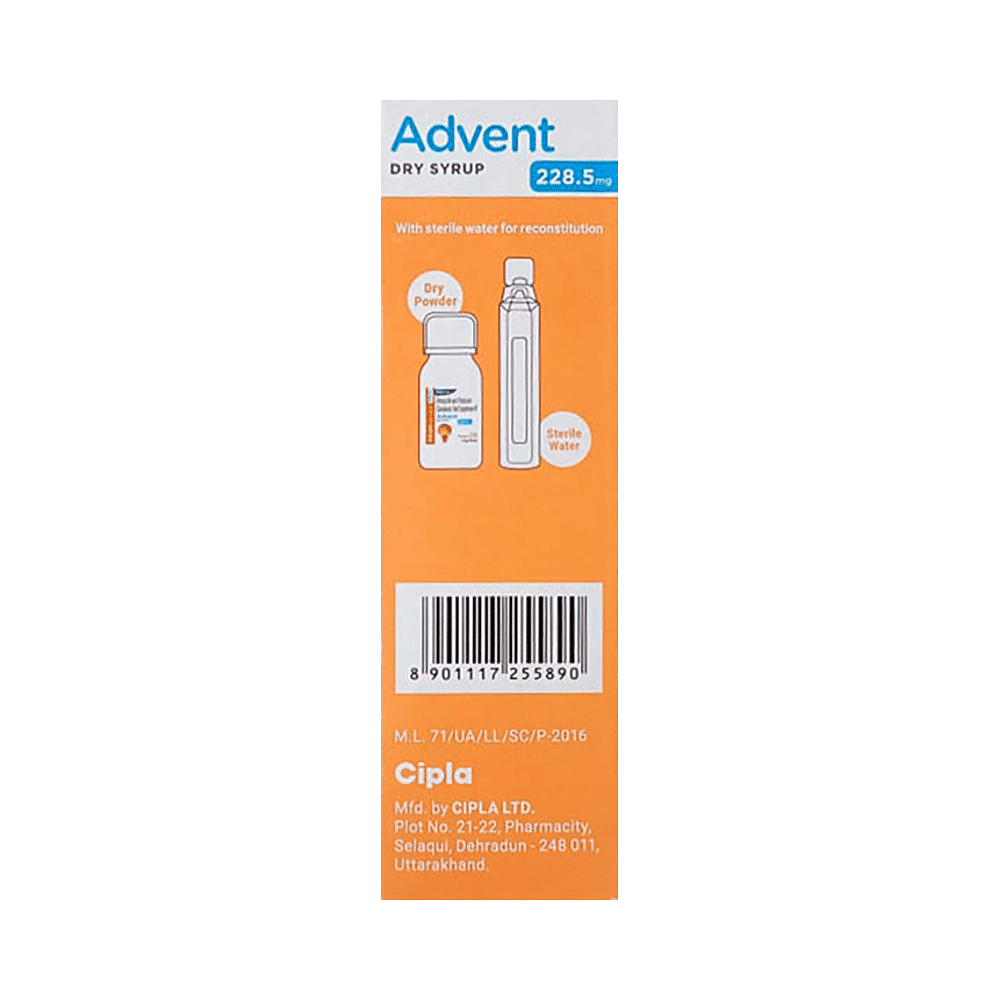
Fermox Dry Syrup
Manufacturer
Fern Biotech
Salt Composition
Amoxycillin (200mg/5ml) + Clavulanic Acid (28.5mg/5ml)
Key Information
Short Description
Fermox Dry Syrup is an antibiotic medicine that helps treat bacterial infections of the ear, nose, throat, chest, lungs, teeth, skin, and urinary tract.
Dosage Form
Dry Syrup
Introduction
Fermox Dry Syrup is an antibiotic medicine that helps treat bacterial infections of the ear, nose, throat, chest, lungs, teeth, skin, and urinary tract. It is capable of killing bacteria that have become resistant to other therapies and thus also helps treat tuberculosis that is resistant to other treatments.
Directions for Use
Your child must complete the entire course of antibiotics. Stopping too soon may cause the bacteria to multiply again or cause another infection.
Safety Information
Side Effects
Bitter taste in the mouth after intake Diarrhea Itchy rash Facial swelling Breathing difficulty
How it works
Fermox Dry Syrup is an antibiotic. It has two active agents amoxycillin and clavulanic acid. Amoxycillin works by preventing the formation of the bacterial protective covering (cell wall) essential for the survival of the bacteria. Whereas clavulanic acid serves a special purpose of inhibiting an enzyme (beta-lactamase) that is produced by resistant bacteria.
Quick Tips
Your child must complete the entire course of antibiotics Encourage your child to drink plenty of water in case diarrhea develops as a side effect Never give Fermox Dry Syrup until and unless prescribed by the doctor Do not give Fermox Dry Syrup to treat common cold and flu-like symptoms caused by viruses Check 'expiry' before giving Fermox Dry Syrup to your child
Related Medicines

Advent 228.5mg Dry Syrup Tangy Orange

Moxiflan CL Dry Syrup

Lymonk CV Dry Syrup

Wixiclav Dry Syrup

Dmox CV Dry Syrup

Tagmox Dry Syrup

Kainoxy CL Dry Syrup

Xylomox CV Dry Syrup

Amoxul Dry Syrup

Moxiphage CV Dry Syrup
Frequently asked questions
Can other medicines be given with Fermox Dry Syrup?
Fermox Dry Syrup may interact with other medications. Inform your doctor about any other medicines your child is taking before starting this treatment. Additionally, consult your child's doctor before administering any medication to your child.
Can my child be vaccinated while on Fermox Dry Syrup treatment?
Antibiotics typically do not interfere with vaccine ingredients or cause adverse reactions in children who have recently been vaccinated. However, children taking antibiotics should not receive vaccinations until they recover from their illness. Once your child feels better, the vaccine can be administered.
Which lab tests may my child undergo while on long-term Fermox Dry Syrup treatment?
During prolonged therapy, your child's doctor may monitor kidney and liver function tests periodically to assess their condition.
Can I give a higher dose of Fermox Dry Syrup than recommended?
No, administering a higher dose of this medication can increase the risk of side effects. If your child experiences increased severity of symptoms, please consult your doctor for re-evaluation.
Can I stop giving Fermox Dry Syrup when my child's symptoms improve?
No, do not discontinue this treatment unless the full course is complete, even if symptoms appear to be improving. The infection may still be present and require further treatment.
Does Fermox Dry Syrup cause diarrhea?
Yes, Fermox Dry Syrup can cause diarrhea due to its antibiotic effects on both harmful and beneficial bacteria in the stomach. Encourage your child to drink plenty of fluids if they experience diarrhea. If dehydration symptoms persist, consult a doctor.
Do all viral common colds result in secondary bacterial infection?
Mostly, bacterial infections do not follow viral infections. Antibiotics should only be used after consulting with your child's doctor.
What color mucus indicates a bacterial infection?
Yellow or green mucus does not necessarily indicate the need for antibiotics. During a common cold, it is normal for mucus to thicken and change color. Symptoms often last for 7-10 days.
What signs require immediate medical attention in my child?
You should call your child's doctor immediately if they experience serious allergic reactions (breathing problems, skin rashes), gastrointestinal infections (diarrhea), or liver damage (weakness, paleness, vomiting). These side effects are rare but can be severe and require expert attention.


